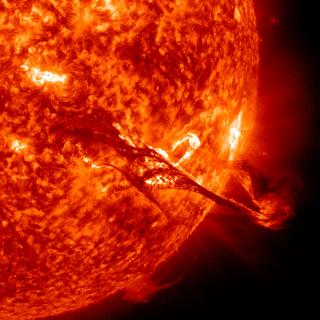Bibcode
Khomenko, E.; Martínez-Pillet, V.; Solanki, S. K.; del Toro Iniesta, J. C.; Gandorfer, A.; Bonet, J. A.; Domingo, V.; Schmidt, W.; Barthol, P.; Knölker, M.
Bibliographical reference
The Astrophysical Journal Letters, Volume 723, Issue 2, pp. L159-L163 (2010).
Advertised on:
11
2010
Citations
13
Refereed citations
11
Description
Based on IMaX/SUNRISE data, we report on a previously undetected
phenomenon in solar granulation. We show that in a very narrow region
separating granules and intergranular lanes, the spectral line width of
the Fe I 5250.2 Å line becomes extremely small. We offer an
explanation of this observation with the help of magneto-convection
simulations. These regions with extremely small line widths correspond
to the places where the granular flows bend from upflow in granules to
downflow in intergranular lanes. We show that the resolution and image
stability achieved by IMaX/SUNRISE are important requisites to detect
this interesting phenomenon.
Related projects

Solar and Stellar Magnetism
Magnetic fields are at the base of star formation and stellar structure and evolution. When stars are born, magnetic fields brake the rotation during the collapse of the mollecular cloud. In the end of the life of a star, magnetic fields can play a key role in the form of the strong winds that lead to the last stages of stellar evolution. During
Carlos Cristo
Quintero Noda